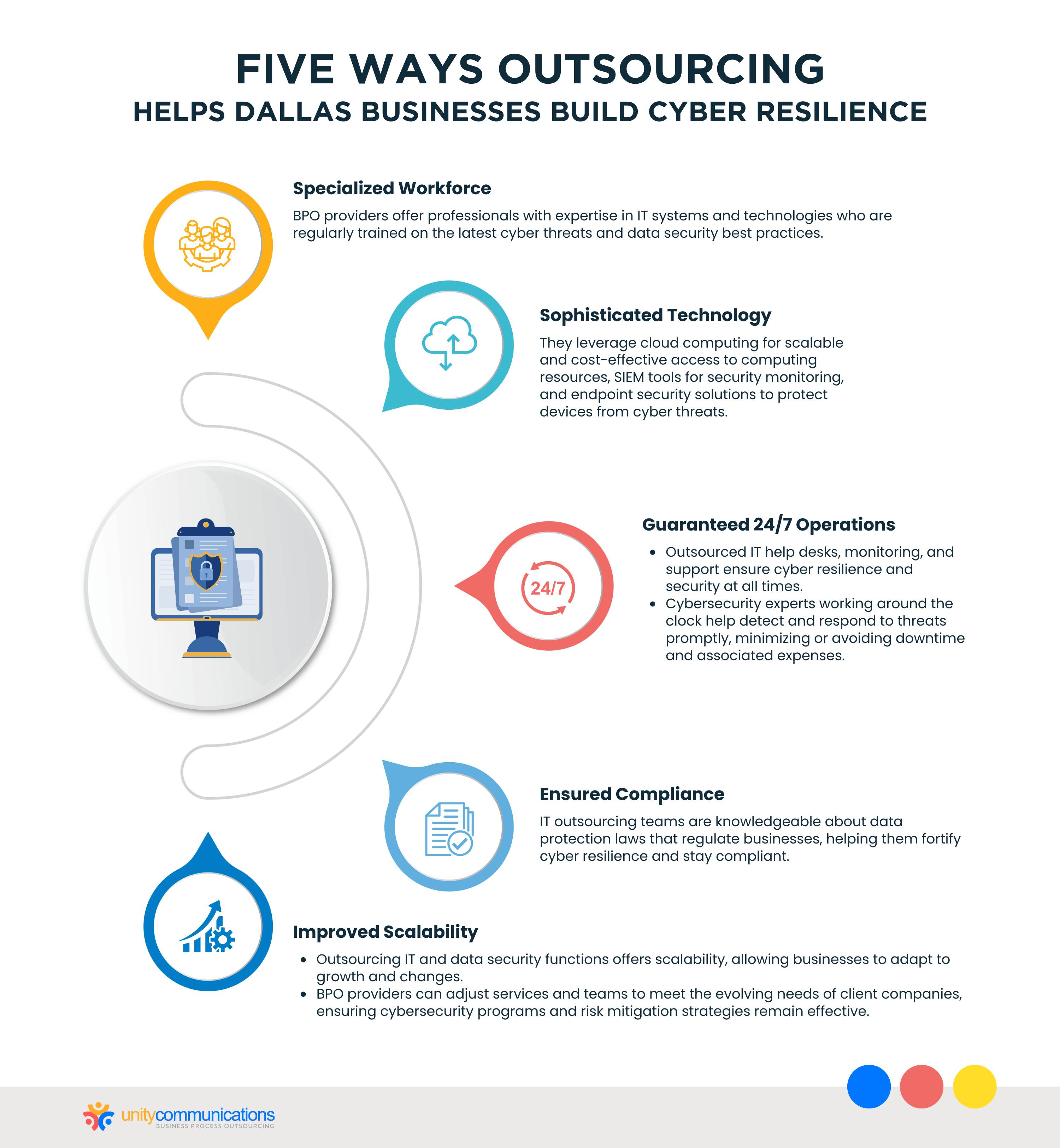Table of Contents
Learn more about outsourcing services for Phoenix businesses. Watch the video below.
Businesses in Dallas rely on technology to operate efficiently and competitively. While today’s innovations offer numerous benefits for scaling, they also increase the risk of cybercrime.
Phishing, malware, ransomware, and other cyberattacks can harm businesses’ financial health, operations, and reputation. Thus, companies increasingly rely on business process outsourcing (BPO) for technical and cybersecurity support.
If you are wondering how a BPO provider in Dallas, TX, can help improve cyber defense, continue reading. This article discusses how outsourcing enables Dallas businesses to strengthen their cyber resilience amid growing threats.
Understanding the Threat of Cybercrimes to Dallas Businesses

Dallas is a major business hub for healthcare, financial services, and technology. The city is home to several Fortune 500 companies and corporate giants, making it an attractive target for cybercriminals. As digitalization and automation become more prominent, cyber threats steadily increase. They also become more sophisticated with the evolution of technology.
Hackers and fraudsters constantly develop new techniques and leverage tools to exploit computer systems and network vulnerabilities. Aside from exploits and botnets, they utilize artificial intelligence (AI) and machine learning (ML) to attack businesses of all sizes.
Such activities often involve data security threats, such as the unauthorized access, use, and disclosure of sensitive data. They might also include malicious attempts to disrupt or damage computer systems and networks.
Cybercrime and data breaches have the following adverse effects on Dallas businesses:
- Operational disruptions. Cyberattacks can shut down entire business systems. Hackers can also steal companies’ intellectual property, such as product plans, trade secrets, and customer lists. Such disruptions can make business operations impossible.
- Financial losses: Dealing with faulty systems might lead to lost revenue. Businesses can incur costs to pay ransom, investigate and respond to attacks, and repair and replace damaged systems or data. They may also be subject to paying costly fines.
- Reputational damage. Customers are less likely to trust and do business with companies that have been hacked. Investors and partners might pull out their shares after learning about a business’s vulnerability to cyberattacks and data breaches.
- Legal liability. Following federal and state regulations, Dallas companies of all sizes may be held legally liable for data breaches. They may be charged for disrupting business operations or the damage brought to customers by exposed, sensitive data.
To prevent such issues, implementing robust cybersecurity measures is a must. Effective strategies protect sensitive data, maintain business continuity, ensure regulatory compliance, and sustain customer trust.
Thus, business process outsourcing for information technology (IT) functions has become popular for Dallas companies seeking to enhance cyber resilience. Outsourcing offers several benefits that can help companies ensure data privacy and protection.
Five Ways Outsourcing Helps Dallas Businesses Build Cyber Resilience

Before we get into the data privacy and security benefits of outsourcing, let us first answer the question: what is BPO? It is a business practice where companies delegate non-core functions to third-party providers. Its primary purpose is to help businesses focus on their core competencies. It also reduces operating costs, improves productivity, and enhances efficiency.
Thus, many businesses rely on BPO providers for various processes, including IT. Outsourcing these functions helps companies install, maintain, and troubleshoot the systems they need for daily operations.
Third-party IT teams also assist companies in their efforts to enhance their cybersecurity strategies. Check out how outsourced IT can help strengthen data privacy and protection below.
Specialized Workforce
Businesses can outsource various IT and cybersecurity functions, such as:
- Security monitoring and incident response
- Security information and event management (SIEM)
- Vulnerability assessment and penetration testing
- Security awareness training
- Help desk services
These tasks require technical knowledge and skills. However, acquiring qualified in-house talent for such functions may be difficult, especially considering Dallas’s ongoing staff shortage.
Fortunately, BPO providers have a pool of professionals well-versed in IT systems and technologies. These workers are regularly trained to understand the latest cyber threats and data security best practices.
Such knowledge and skills are essential for troubleshooting systems at risk of cyberattacks.
By outsourcing IT and cybersecurity, companies in Dallas can implement robust strategies that protect client data and business systems and enhance cyber resilience.
Sophisticated Technology
State-of-the-art tools and infrastructure are essential for adequate data privacy protection. However, some companies, such as small businesses, might have limited resources to implement updated technology.
IT outsourcing providers leverage advanced software, hardware, networks, and systems critical for cybersecurity. These technologies include firewalls, intrusion detection systems (IDS), intrusion prevention systems (IPS), web and email filtering, and data encryption.
In addition to this, IT BPO providers also utilize the following software:
- Cloud computing. This platform offers remote workers scalable and cost-effective access to computing resources wherever they are. BPO IT teams can use it to host security solutions, store logs, and run security analytics.
- SIEM tools. Monitoring systems and networks for security threats can be tedious. SIEM tools help businesses spot suspicious activity and potential cyberattacks by collecting and analyzing security logs across the company’s systems and networks.
- Endpoint security solutions. These software applications protect devices, such as laptops, smartphones, and tablets, from cyber threats and attacks. They work by monitoring devices for suspicious activity and blocking it if detected.
Guaranteed 24/7 Operations
Cyberattacks can happen anytime, and businesses must respond quickly to mitigate the threat and damage. Outsourced IT help desks, monitoring, and support can help companies in Dallas ensure cyber resilience and security at any time of the day.
Cybersecurity experts working beyond regular business hours help companies detect threats launched at midnight, preventing costly data and system damage. A 24/7 IT support team can address data breaches or cyberattacks whenever they occur and restore networks immediately. This swift response helps minimize or avoid downtime altogether.
Additionally, cyberattacks and data breaches incur expenses. These costs include payments for restoring systems and data, investigating the breach, and notifying affected customers. Thus, businesses can save significant money by having a team that prevents and mitigates cyber threats around the clock.
Ensured Compliance
Navigating complex and dynamic federal and state consumer privacy regulations can be challenging. Errors and delays in managing compliance requirements can lead to data breaches and penalties.
IT outsourcing teams are well-versed in the different data protection laws that regulate Dallas businesses, which can help them fortify cyber resilience. These teams help companies stay compliant and avoid data breaches that can lead to costly penalties and legal charges.
Below are the data privacy regulations businesses in Dallas must comply with:
- The Texas Data Privacy and Security Act (TDPSA) requires businesses to ask consumers for permission before collecting or processing their data. It also requires them to implement security measures to protect this information. The TDPSA gives customers the right to access, correct, delete, and port their information.
- The General Data Protection Regulation (GDPR) applies to any company that collects or processes information about European Union citizens. Like the TDPSA, this law demands that businesses ask consumers for permission before collecting or processing their data and allows them to access, correct, delete, and port their information.
- The California Consumer Privacy Act (CCPA) applies to any company that collects or processes the personal data of California citizens. It requires vendors to provide consumers with the right to know which information is being collected. The CCPA also allows customers to request the deletion of their data.
- The Health Insurance Portability and Accountability Act of 1996 (HIPAA) applies to all healthcare organizations. It safeguards sensitive patient data by requiring medical facilities to implement security measures that ensure the confidentiality and protection of patient information, both in electronic and paper formats.
Improved Scalability
Small, medium, and large enterprises in Dallas are constantly growing and changing. They acquire more data, systems, and applications as they grow, making complying with industry regulations and protecting against cybercrimes even more challenging.
Scalability is one perk of outsourcing IT and data security functions. This capability helps Dallas businesses improve their cyber resilience. BPO providers can adjust their services and teams to meet the needs of client companies.
This flexibility also ensures that cybersecurity programs and risk mitigation strategies adapt to threats or business growth changes.
How to Successfully Outsource Cybersecurity Support

As discussed, outsourcing is a strategic way for businesses in Dallas to build cyber resilience and improve data protection measures. However, partnering with a BPO company doesn’t automatically ensure these benefits.
Here are a few steps to effectively integrate third-party IT and cybersecurity functions into business models:
- Clearly define data privacy goals and requirements. Before finding an IT BPO partner, you should identify how and why you need to outsource. Listing your biggest cybersecurity concerns, budget and resource constraints, and federal and state regulatory compliance requirements helps ease outsourcing.
- Vet potential BPO providers thoroughly. Signing a contract with the first BPO provider you see is not practical. List potential partners and compare crucial details to ensure you get your money’s worth. Look at their experience, reputation, certifications, services, and rates to properly understand their differences.
- Draft a service-level agreement (SLA). After choosing a BPO partner, create a comprehensive SLA. Ensure it outlines the services you need to outsource, the quality of work you expect, and the service costs. Your SLA should also include provisions for dispute resolution and service termination.
- Establish communication and collaboration channels at the onset. Communication is critical to ensuring you and your IT BPO partner are on the same page. It helps you stay updated on any issues and keep track of timelines, goals, regulations, and expectations.
- Monitor and evaluate BPO team’s performance regularly. Monitor your BPO partner’s work to ensure it is constantly meeting your SLA terms. You should also regularly provide constructive feedback to help the third-party workers improve.
Cybersecurity Threats to Watch Out For
Cybercriminals commit data security crimes for various reasons, with financial gain being the most common. They may launch attacks for power and control, revenge, or the challenge.
Below are the different cyber security and data breach threats businesses may encounter:
- Phishing attacks aim to deceive users into revealing their sensitive data. Such confidential information includes passwords, PINs, or credit card numbers. These attacks often look legitimate and are launched through emails or text messages.
- Malware can damage computers, servers, clients, or networks. This malicious software can also acquire sensitive data, spy on users, or interfere with system access and security. It spreads through emails, phishing websites, and infected USB devices.
- Ransomware is malware that threatens to reveal stolen data or restrict, deny, or permanently block user access unless a ransom is paid. It is usually disguised as a legitimate file to trick users into downloading and opening the software.
- Man-in-the-middle (MITM) attacks are when hackers interfere with the communication of two parties while pretending to be one of the involved. This interference allows them to steal data, input new ones, and redirect traffic to a malicious website.
- Insider threats are often caused by employees with malicious intent or insufficient cybersecurity awareness. They pose significant risks of sensitive information leakage or cyber sabotage, which can harm companies in the competitive Dallas business scene.
Fortunately, strategic outsourcing offers direct solutions to safeguard businesses in Dallas against these cyber threats and help them stay resilient.
Real-life Dallas Cyberattacks and Possible Outsourcing Solutions

According to The Dallas Morning News, Texas has had at least 11 confirmed ransomware attacks since March 2022. With the recent data security crimes, and to combat future threats and attacks, the Dallas City Council recently approved a cybersecurity detection system worth nearly $4 million.
Below are the two most significant cybercrime cases in Dallas and Texas that might have spurred this decision.
American and Southwest Airlines Pilot Applicants’ Predicament
Austin-based air transport recruitment support, Pilot Credentials, was hacked in April 2023. However, they did not discover this until May of the same year.
The data breach affected nearly 5,475 pilot applicants for American Airlines in Fort Worth and 3,009 for Southwest Airlines in Dallas. Hackers gained unauthorized access to their data, including their:
- Names
- Birth dates
- Passport numbers
- Social Security numbers
- Driver’s license numbers
- Pilot’s license numbers
- Airman certificate numbers
Points of vulnerability. Several factors may have led to the Pilot Credentials hacking, including weak security controls, outdated security software, or an underqualified workforce. The company also lacked constant cyber monitoring and quick response time.
Outsourcing’s solution. With a dedicated 24/7 team to monitor and immediately address the cyberattack, Pilot Credentials could have minimized data breaches. Additionally, outsourced IT and cybersecurity could have provided them with updated technology and a more proficient workforce.
The Dallas City Hall Ransomware Attack
In May 2023, a ransomware attack by Royal hit the City of Dallas. It affected 230 servers and 1,168 workstations, including those of 311, the municipal court, and the Dallas City Hall website.
Aside from disrupting operations, the cyberattack resulted in the theft of nearly 819,000 files. Ultimately, the ransomware attack cost the city $8.5 million in recovery services, interdiction, and mitigation expenses.
Points of vulnerability. Though the primary cause of the ransomware attack was never stated, speculations suggest that a phishing email was opened or a trojan file was downloaded. Outdated software, such as endpoint security solutions, and unaware staff could be the main points of vulnerability.
Outsourcing solution. BPO providers use sophisticated anti-ransomware and endpoint security solutions. Such measures can help detect and alert users of malicious emails and files before downloading or opening them.
Cybersecurity experts from third-party providers can also train and educate employees on spotting and responding to phishing emails and files.
The Bottom Line
Recent cyberattacks in Dallas prove that big and small companies are still vulnerable to cybercrimes, even in a high-tech world. Robust data privacy protection strategies remain critical for businesses.
Outsourcing can be a strategic tool to help Dallas businesses of all sizes prevent cyber threats and remain resilient. It offers several benefits, including 24/7 monitoring and support, scalability, and access to advanced technology.
Let’s connect if you are looking for a reliable BPO partner for your IT and cybersecurity needs. Unity Communications has robust security technologies and over 350 skilled virtual assistants to help your business protect against cyberattacks.




